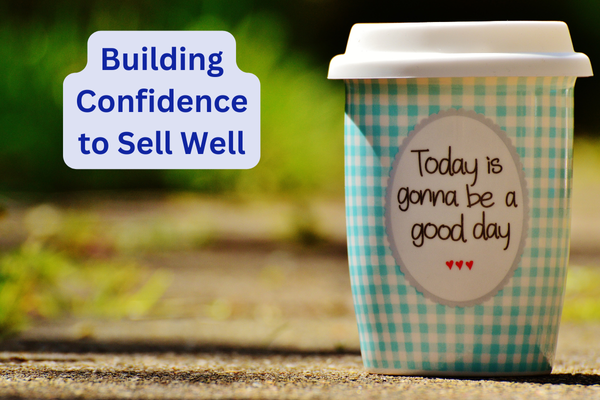Sales (particularly for business owners) isn’t always about being a great ‘talker’ or ‘having the gift of gab’ but rather it’s often having a sales process and communicating well. As a business and marketing coach, I work with clients on all this (and more) to help them improve their sales skills. This is what I’m going to cover in this blog –
Building Your Self-confidence and Skills So That You Can Be Great at Selling
Set & Track Your Goals
Just as you should have business goals, so should you have marketing and sales goals. Also track your successes, results and what works. Are you better at selling the smaller product or service, and if so, why? Do you sell better to some customers and not others? How can you improve this? If you know your sales conversion rate is say 40%, then another goal would be to increase this. Be reasonable about the goal, and specific. You might want to improve by 5% per month on last month’s numbers. Ideally in sales, you’ll want weekly (smaller) goals, so that these compound and build and after a year, you really have achieved something pretty awesome.
Set Yourself Up for Success
The first thing that you need to do is prepare. This means knowing your product or service well; clearly being able to articulate its benefits and features. Also know your customer, especially if a business, then look them up. Stand in your customer’s shoes and ask yourself what they would likely need to know. Have that information on hand, in advance, so that the prospect doesn’t even have to ask; anticipate their needs.
Use Sales Tools to Help
I talk about being prepared, but this also helps with preparedness too. If you’re selling a service, often this is intangible. It’s like business coaching, how would a potential client know I’m great at business coaching? One way is to share all the fabulous 5-star Google reviews. Do this before the sales, so you’re removing buyer doubt in advance. You might use props or samples. Another tool might be your website, LinkedIn profile or other online resources that get a great message across. Another tool is organisation and systems – a great sales process will definitely help you. Consider practice, processes and great sales scripts all the tools. Initially if you need to write a script, go for it (but avoid reading), just ensure you hit the key points (which you might have yellow highlighted).
Objections
This is part of your preparation. In sales, there will often be objections – reasons that the prospective new client or customer gives you as to why they are not ready to buy (yet). Firstly, objections are great! This is not them bagging you, but instead, it’s them saying they’ve not convinced yet, but they want to be. You can prepare for objections by pre-thinking about this and writing down the responses. Again, reviews and testimonials (pre-provided) help with removing some objections. A warranty or guarantee might help with these. See an objection as an opportunity in disguise.
Get the Right Mindset
Firstly, understand that ‘sales’ is not a dirty word. It’s often primarily about educating your prospect on how you, the product or your service, can help them. If you hear yourself say to yourself or others “Oh, I’m hopeless at sales”, then stop that right NOW! If you tell yourself (or others) something enough, you (and others) will believe it. Another fallacy is that quiet or introverted people are no good at selling. That’s complete rubbish too. Introverts make great sellers because they actually listen to their prospect; a skill that absolutely helps in selling.
Sell When You’re on a Roll
So, now I’m moving more to building confidence. Think about how you feel when you’ve just made a sale. Pretty good, even, damn great! After you’ve made a sale is the absolute best time to action another sales call, visit or follow up. You’re riding a high and that comes across. When you’re desperate, that shows, so if you’re feeling desperate, that’s not the moment to go into sales mode. I know, it can be hard if you’ve not got a previous sale to roll off, so if that’s the case, action sales when you’re feeling fresh (most likely in the morning) and do it when the endorphins are flowing – for example you might have gone to the gym before work, or perhaps walked to work, or even got a compliment from a boss, co-worker or client. If it’s a sales morning and no compliments are coming, then go back and read your testimonials and reviews – see how others have said you’re really good at what you do (because you are) and believe those kind words – and get in there and make the calls.

Set the Mood
Above, I talked about setting your mindset – being positive, but you can also do this in other ways. Even if you’re just making phone calls, dress successfully as when we look good, we often feel good. If you’re in a dull or windowless room, then put on some lights – so it feels/looks brighter. Burning essential oils can often assist. If you feel happy, you’re more likely to be happy and people engage better with people who are positive and happy. Positivity also comes about by hanging out with positive people and being positive yourself. When you walk into the building in the morning, do you greet everyone with a super positive ‘Good morning!’ or do you hang your head low and mumble something?
Learn from Mistakes; but Don’t Harp on Them
In any aspect of business, including sales, it’s important to work out why something didn’t go right. In sales, it can be so many things; the prospect may not have been ready, or chose to buy elsewhere, or realised they really didn’t need or want what you’re offering. That’s ok. Firstly, don’t take it personally – even if you’re selling yourself (that is, a service you provide, like business coaching). It might feel personal, but it’s not. Why didn’t they buy? Be honest, maybe you messed up the sales process, or maybe it had absolutely nothing to do with you. If it was you, then what can/should you do differently next time? In other words, learn, grow and improve.
Practice on Less Important Opportunities
If you’re new to sales and you’re prospecting, I often say, build a list, build your sales process and then hit it. But there is a little secret, don’t start with your AAA, top prospect that you really, really want to get on board. Instead, reach out to the least favourable prospect and practice on them. If you don’t get it, then you won’t be terribly disappointed. However, once you’ve had some practice, got better and learnt from doing, then you can hit the prospects that you really want – and will be more likely to attain.
Get Coaching or Training
Learning by getting training or coaching will help you improve your sales processes and likely your actual sales manner, especially if the training involves some practice. Another great strategy is to get someone who is good at sales to do a ‘secret shopper’ on you, or listen to your sales spiel and afterwards (never in front of the prospect) run through with you on how to improve. Be selective of the person you select; it should be someone who will support you and help you grow in a positive way.
Don’t Aim to Overachieve, but also Not to Underachieve
Avoid setting yourself up for failure, by saying you’ll sell 300% more than you did last month, then reality is that this may not be achievable. However, saying you’ll improve your sales rates by 1% every 3 months isn’t much of a stretch. I’m not saying don’t have big goals, or big dreams, but break those objectives down into smaller bite-size chunks.
Take Responsibility
In life, in business and in sales, how we perform is up to us. Don’t blame the economy, or your competition, or the client (or any other factors) for any sales mishaps that occur. Stop playing the victim role, step up and take responsibility (without self-blame). Rarely does even the best salesperson get every single sale; it’s a numbers game, so simply play the game, do your best and learn to improve day after day.
If you need any help with your business, marketing strategy or sales process – contact me – I’d love to help you achieve your full potential.






